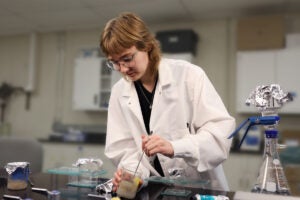AUSTIN, Texas—Two researchers at The University of Texas at Austin College of Pharmacy have been honored for developing a method for delaying the release of a medication until the drug can reach the desired location in the body.
The research was conducted by pharmacy graduate student Jiping Liu and Dr. Robert O. Williams III, associate professor of pharmaceutics, and was titled, "Novel Curing Process for Cellulose Acetate Phthalate Coated Beads." Their work was cited as the best research paper at the 20th annual meeting of the Pharmaceutical Technology Conference and Exhibition in Liverpool, U.K., this spring. It received the Penwest Award for Scientific Excellence, given to the top research paper presented at the meeting.
Williams said Liu was working with a non-steroidal, anti-inflammatory drug in the form of beads and cellulose acetate phthalate (CAP), an enteric polymer that is used to delay release of active drug substances to the small intestine rather than the stomach. CAP is used for tablets. It had not previously been used to coat beads because the high surface area of the beads has caused dissolution failure and loss of proper dosage when much of the medicine is released too early into the stomach.
In this research, Liu and Williams found that by using a combination of heat and humidity to cure the film on the beads, enteric coating of beads was indeed possible, so the medicine could reach the area where it would be most effective.
Williams said finding a way to delay release until the drug reaches the intestinal area is especially important because non-steroidal, anti-inflammatory drugs "really upset the stomach and can cause ulcers. For arthritis patients who are on high doses, these drugs can ulcerate the stomach and cause bleeding. These types of polymers are really useful."
He added, "the industry likes beads, because with beads you get a much more uniform release pattern." Because patients can open the capsules and sprinkle the beads on food, elderly patients especially find it easier to take. "This increases patient compliance," Williams said.
Liu is from Fuzhou, China. She will be graduated with the Ph.D. in pharmacy in August, and is taking a position with Sanofi-Synthelabo in Pennsylvania.
Williams’ lab focuses primarily on the formulation, development and delivery of small organic compounds, peptides and proteins by pressurized metered-dose inhaler delivery technology. Other current research involves drug delivery by aerosol devices. Raw materials and formulations are routinely investigated in the lab using atomic and electron microscopes.
For more information, contact Vicki Matustik at the College of Pharmacy at (512) 232-1769.



